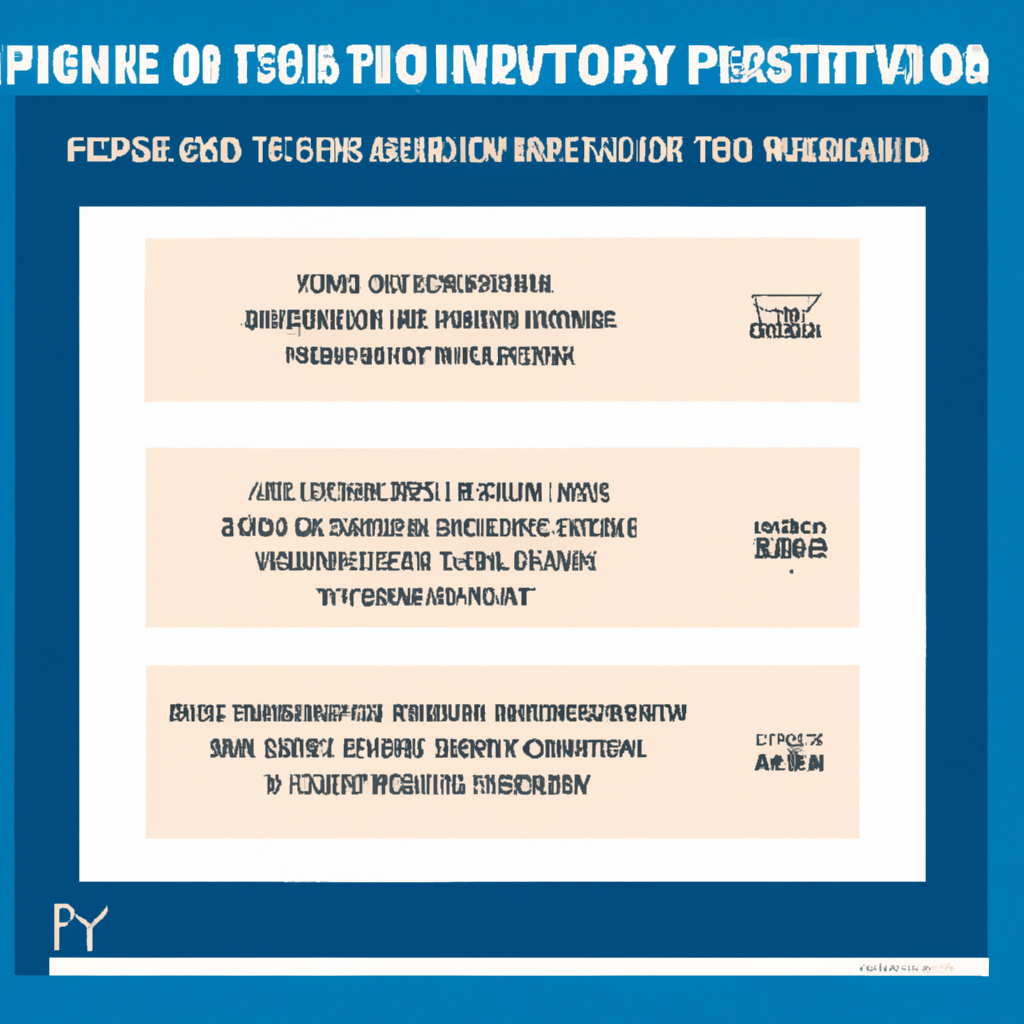What Is The Process Of Evaluating The Potential Of An Investment Property?
October 9, 2023 | by Catherine Jones

Are you curious about the process of evaluating the potential of an investment property? Well, you’ve come to the right place! In this article, we will dive into the various steps involved in determining the worth of an investment property. Whether you’re a seasoned property investor or just starting out, understanding the evaluation process is crucial to making informed decisions and maximizing your returns. So, let’s get started and uncover the secrets to assessing the potential of an investment property!

Determining Investment Goals
Investing in real estate can be a lucrative venture, but it’s important to establish clear investment goals before diving in. A self-assessment is a crucial first step in determining these goals. Think about your financial situation, risk tolerance, and long-term objectives. Are you looking for a steady source of passive income, or are you aiming for significant capital appreciation? Understanding your investment goals will help guide your decision-making throughout the process.
Establishing financial objectives is the next step in evaluating the potential of an investment property. Consider what you hope to achieve financially from your investment. Are you looking to generate a certain amount of monthly rental income? Do you have a specific target for the return on your investment (ROI)? Setting clear financial goals will help you stay focused and make informed decisions as you move forward.
Defining your ROI expectations is another crucial component of evaluating the potential of an investment property. ROI is a measure of how much money you can expect to earn on an investment relative to its cost. Take the time to research and determine what ROI is realistic for the real estate market and type of property you are considering. This will give you a benchmark to compare potential investments against and ensure you have reasonable expectations for your return.
Researching the Real Estate Market
Once you have established your investment goals, it’s time to delve into researching the real estate market. Analyzing local market trends is an essential step in understanding the potential of an investment property. Look at historical data and projections for the area you are interested in. Are property values increasing or decreasing? Are there any indicators that suggest the market is strong or unstable? Understanding these trends will help you make informed decisions about potential investments.
Examining supply and demand is another important factor to consider when evaluating the potential of an investment property. Look at the current inventory of properties in the area and compare it to the level of demand. Are there a lot of available properties but few buyers or tenants? Conversely, is there a high demand for properties but limited supply? Understanding the balance between supply and demand will give you insight into the potential profitability of an investment.
Investigating future development plans in the area is also crucial when evaluating the potential of an investment property. Look for any upcoming infrastructure projects, commercial developments, or zoning changes that could have a positive impact on property values. Understanding the potential for growth and development in an area will help you assess the long-term viability of an investment.
Assessing the Location
The location of an investment property plays a significant role in its potential for success. When assessing the location, there are several factors you should consider.
Accessibility and proximity are important considerations when evaluating the potential of an investment property. Is the property located in a convenient location with easy access to transportation, highways, and amenities? Properties that are easily accessible are more likely to attract tenants or buyers, resulting in a higher potential for income or appreciation.
Exploring neighborhood quality is another crucial aspect of assessing the location. Research the crime rates, school district ratings, and overall livability of the neighborhood. A safe and desirable neighborhood will attract quality tenants and result in higher property values over time. Take the time to drive around the area and get a feel for its overall aesthetic and vibe.
Examining amenities and facilities in the surrounding area is also important when assessing the location. Are there parks, shopping centers, restaurants, and other amenities within proximity to the property? These amenities can enhance the desirability of the property and increase the potential for rental income or resale value.
Analyzing the Property’s Physical Characteristics
Once you have evaluated the location, it’s time to analyze the physical characteristics of the property itself. This assessment will give you a better understanding of its condition, age, and layout.
Inspecting the building’s condition is a critical step in evaluating the potential of an investment property. Hire a professional inspector to thoroughly assess the property and identify any issues or necessary repairs. Understanding the current condition of the property will help you budget for any necessary improvements and avoid unexpected expenses in the future.
Assessing the building’s age is also an important consideration. Older properties may require more maintenance and updates, which can eat into your potential profits. On the other hand, newer properties may have higher upfront costs but require less ongoing maintenance. Consider your budget and long-term goals when evaluating the age of the property.
Evaluating the property’s size and layout is another factor to consider. Does the property have sufficient space for the intended use? A property with a functional layout and ample square footage will likely be more appealing to tenants or buyers, increasing its potential for income or appreciation.

Evaluating Potential Income
Assessing the potential income of an investment property is a crucial step in evaluating its potential for success. Several factors should be considered when evaluating the income potential.
Determining the rental market value is a key component of assessing potential income. Research rental rates in the area for similar properties. Compare the property you are considering to others in terms of size, location, amenities, and overall condition. This will give you an idea of the potential rental income you can expect to generate from the property.
Analyzing rental demand is also important when evaluating income potential. Look at vacancy rates in the area and the overall demand for rental properties. High demand and low vacancy rates indicate a strong rental market, increasing the potential for consistent rental income.
Estimating rental income potential involves considering factors such as occupancy rates, rental rate increases over time, and potential rental expenses. Take into account any potential vacancies and factor in annual rental rate increases to project your income potential accurately.
Assessing Expenses and Cash Flow
In addition to evaluating potential income, it’s essential to assess the expenses and cash flow of an investment property. This analysis will help you determine if the property is financially viable and if it will generate positive cash flow.
Accounting for fixed and variable expenses is a crucial step in assessing expenses and cash flow. Fixed expenses include items such as property taxes, insurance, and mortgage payments. Variable expenses include maintenance and repairs, vacancies, and utilities. It’s important to accurately estimate these costs to determine your overall expenses and potential cash flow.
Considering property management costs is another important consideration. If you don’t plan on managing the property yourself, you will need to factor in the cost of hiring a property management company. These costs can vary, so research local rates and factor them into your analysis.
Calculating cash flow potential involves subtracting your total expenses from your potential rental income. A positive cash flow indicates that the property is generating more income than it costs to maintain, while a negative cash flow indicates the opposite. Ensure you have a thorough understanding of the cash flow potential before making a final decision on an investment property.

Understanding Cash-on-Cash Return
Cash-on-Cash return is a metric used to evaluate the profitability of an investment property. It measures the annual return on the cash invested in the property.
Calculating cash-on-cash return involves dividing the annual net operating income (NOI) by the total cash invested in the property. The result is a percentage that represents the annual return on investment.
Interpreting cash-on-cash return involves comparing it to your ROI expectations and other investments. If the cash-on-cash return meets or exceeds your target ROI and compares favorably to other investment opportunities, it indicates a potentially lucrative investment.
Comparing cash-on-cash return with other investments is an important step in evaluating the potential of an investment property. Consider the risk and return of other investment options, such as stocks or bonds, and compare them to the potential cash-on-cash return of the property. This will help you assess the relative profitability and make informed investment decisions.
Analyzing Financing Options
Understanding financing options is crucial when evaluating the potential of an investment property. Researching mortgage rates is an important first step. Compare rates from various lenders to ensure you secure the most favorable terms. A lower interest rate can significantly impact your overall return on investment.
Understanding loan terms is also critical when evaluating financing options. Consider factors such as the length of the loan, the down payment required, and any additional fees or penalties. Ensure you have a full understanding of the terms before committing to a loan.
Comparing different financing options is an essential step in evaluating the potential of an investment property. Consider traditional mortgages, government-backed loans, and other financing options available to you. Compare the terms, requirements, and overall costs of each option to determine the best fit for your investment goals.

Conducting a Risk Assessment
Investing in real estate comes with inherent risks, so conducting a risk assessment is crucial when evaluating the potential of an investment property.
Evaluating market risk involves considering factors such as economic conditions, interest rates, and overall market stability. Real estate markets can fluctuate, so it’s essential to consider potential risks and their potential impact on your investment.
Assessing property-specific risk factors involves considering factors such as property location, condition, and potential for appreciation. Properties in high-crime areas or those with significant maintenance issues may pose higher risks to your investment. Evaluate these factors carefully to determine if the potential returns outweigh the potential risks.
Considering economic and political factors is also essential when assessing risk. Economic downturns or political instability can impact the real estate market and property values. Stay informed about local and national economic conditions and consider their potential impact on your investment.
Performing Due Diligence
Before finalizing the purchase of an investment property, it’s crucial to perform due diligence. This process involves obtaining property inspections, reviewing legal and financial documents, and conducting title searches.
Obtaining property inspections is a critical step in due diligence. Hire a professional inspector to thoroughly assess the property’s condition and identify any potential issues. This will help you avoid any unexpected expenses or complications down the line.
Reviewing legal and financial documents is another essential component of due diligence. Ensure you have a clear understanding of the property’s title, any liens or encumbrances, and any existing leases or agreements. Review financial statements to ensure the property’s income and expenses align with your projections.
Conducting title searches is the final step in due diligence. This process involves researching the property’s ownership history, any existing liens or judgments, and any potential legal issues. A thorough title search will help you ensure there are no surprises or legal complications associated with the property.
By following these steps and thoroughly evaluating the potential of an investment property, you can make informed decisions and increase your chances of success in the real estate market. Remember to consult with professionals, such as real estate agents, inspectors, and financial advisors, to ensure you have all the necessary information and expertise to make the best investment choices for your goals.

RELATED POSTS
View all


